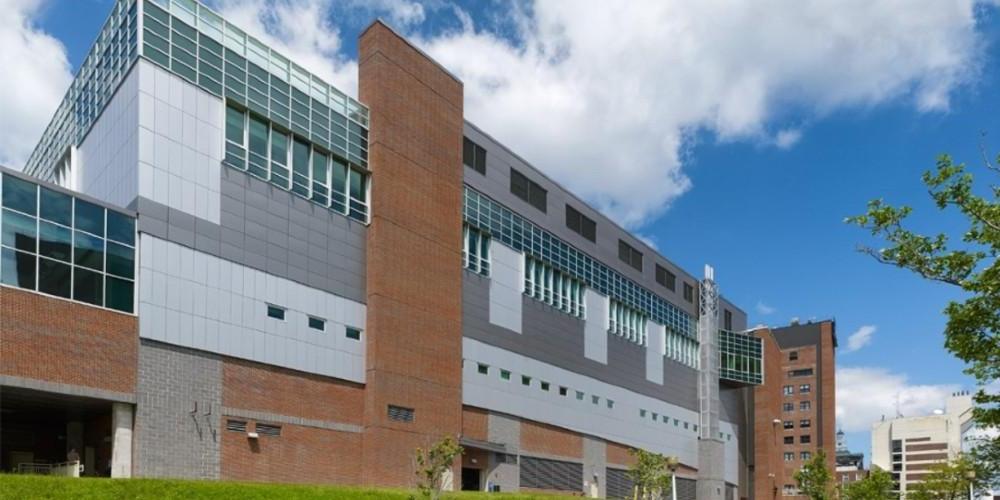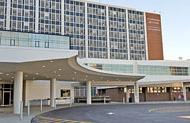Spinal Cord Injury Medicine Fellowship
The SUNY Upstate/VA Medical Center SCI Medicine fellowship is a joint fellowship occurring at both institutions and sponsored by the PMR residency, SUNY Upstate Medical University Department of PMR. The program utilizes the unique strengths of both centers to provide a comprehensive spinal cord injury medicine training program to fellows. The position is funded for two positions annually, and is ACGME accredited through the American Board of Physical Medicine and Rehabilitation.

Location
The fellowship is in Syracuse, NY, located in central/Upstate New York, and the city has the amenities of an academic-focused college municipality with the scenic and rural surrounding regions of upstate New York. The Syracuse VA Medical Center and SUNY Upstate Medical University, along with the academic medical center Upstate University Hospital, are adjacent to Syracuse University – all within short walking distance.
The Fellowship provides training in the full spectrum of SCI care, from the acute stage immediately after injury, to chronic care years after injury. Experiences are at two Centers: the Syracuse VA Medical Center and Upstate University Hospital.

The Syracuse VA Spinal Cord Injury Center
The VA Medical Center boasts a state-of-the-art Spinal Cord Injury and Disorders center with a large volume of both traumatic and non-traumatic SCI referrals. The VA SCI Center is among the largest facilities of its kind in the nation. It is comprised of a 30 bed SCI/D service located at a full-service VA hospital with both Neurosurgery and Orthopedic spine surgery on-site. The VA SCI Center features include all of the following:
- Advanced care technology including 3 different robotic exoskeleton systems (INDIGO, REWALK and ECKSO)
- Prescribing advanced care technology devices for home use
- Top ranked prosthetics department in the country
- Prosthetics department provides manual and power wheelchairs and a wide variety of assistive technology services
- Advances technologies utilized include Robotic feeding devices, eye-gaze based communication devices for veterans with ALS, 3-dimension wound cameras, and extensive clinic-to-home telehealth
- Ventilator-equipped, training for fellows includes intricacies of ventilator management in persons with high tetraplegia
- 24 hour on-site respiratory therapy, pulmonology and on-site SCI medicine hospitalists to assist with management of high medical acuity
- Active human research projects include electrical stimulation for bladder management in SCI, eye-gaze tracking for ALS neurocognitive testing, and balance for cervical myelopathy.
Upstate Medical University
Upstate University Hospital is the Level I Trauma Center for adults and is the only Level I Center for children for an even larger region including western NY. The Upstate system serves a region of approximately 2 million people and includes these services:
- Large spine care program through Orthopedics, Neurosurgery, and PMR that encompasses in- and outpatient care.
- Frequent new traumatic/non-traumatic spinal cord cases in the acute hospital requiring early PMR consults.
- Large volume of acute referrals for Spinal Cord Injury rehabilitation at Upstate’s 50 bed Inpatient Rehabilitation Facility (IRF) within Upstate University Hospital.
- Full complement of spinal cord injury services in the IRF, including dedicated SCI therapists, robotics, and counseling services.
- Experiences span acute hospital, inpatient IRF, and outpatient services, for adults and children.
- Pediatric care for children with SCI/D is directed by subspecialty board certified pediatric physiatrists, and includes care across the lifespan for congenital and early onset conditions.
- Active research includes systematic search and reviews, large database analysis, and health and wellness programs.

Fellowship Rotations
Fellows work directly with and take a junior supervisory role to the Upstate PMR residents on service, where they care for a wide variety of SCI/D cases including acute traumatic and non-traumatic SCIM rehabilitation, wound care, ALS, and neurologic conditions such as multiple sclerosis with spinal cord involvement. During 6 months of core SCIM training the fellows will focus upon inpatient and consultive care at the VA and Upstate, and outpatient SCIM physiatry at both sites. During the core rotations, the fellow will observe spine surgeries from both Orthopedists and Neurosurgeons, such as decompression and fusion. There is opportunity to observe and work directly with rehabilitation nurses and therapists skilled in SCI rehabilitation. Psychologists and rehabilitation counselors are also available to address adjustment to disability and return to work issues. All rotations, both core and elective, involve protected research time for the fellow to pursue conduct of research and subsequent presentation and publication of their work; the fellow is provided with fully paid travel to both the ASIA and ASCIP conferences annually. Core rotations integrating inpatient and outpatient exposures are staggered with outpatient-focused specialty rotations throughout the year, which include:
- Outpatient SCI Medicine. This rotation focuses upon outpatient SCI at Upstate and the VA. Emphasis will be placed on acquiring procedural skills such as musculoskeletal ultrasound, intrathecal baclofen pump refill, steroid injection, botulinum toxin injections, and use of ultrasound/EMG/electrical stimulation guidance for procedures. The fellow will observe baclofen pump trials and implants.
- Neuro-urology and neurogenic bladder. The fellow gains mastery in performance of urodynamics studies and management of neurogenic bladder, and receive exposure to surgical procedures such as the Mitrofanoff procedure, bladder augmentation and cystoscopy, and management of urinary tract stones. The fellow gains expertise in sexuality and reproductive medicine/fertility in SCI through specialty clinics in VA urology and Upstate.
- Research. Fellow will focus upon scholarly activity and gain an understanding of biostatistics. The fellow will initiate a new research or quality improvement project, or take a leading role in an existing project. Fellow will be allowed to present findings of his/her work at the ASIA and ASCIP conferences, and submit a manuscript to a major peer-reviewed journal by the end of the fellowship. The research rotation is positioned early in the rotation schedule, to allow for this. Two full-time SCI human subjects research assistants are available to help the fellow develop their research portfolio.
- Pulmonary management. The fellow acquires expertise in managing neuromuscular respiratory failure (i.e. neurogenic diaphragmatic paralysis – ventilator defect), and understands basic tenets of hypoxemic respiratory failure as well. Ventilator management, secretion management, tracheostomy, non-invasive ventilation and sleep are key focuses of the rotation.
- Pediatric SCI. The SCI fellow will gain exposure to pediatric SCI, through the Upstate acute and IRF services and spina bifida outpatient programs for children and adults. These experiences offer unique medical, surgical and rehabilitative concerns through a lifetime approach. The fellow will see pediatric urodynamics and pediatric neuro-urology.
- Skin and wound management. The fellow will gain mastery in management of all nature of wounds in SCI, including pressure ulcers, shear injuries, and burns. The fellow will gain exposure to wound surgery including rotational flaps, debridements, grafts and amniotic tissue insertion.
Please contact Steven W. Brose, DO for any further questions about the program.
Steven W. Brose DO, Steven.Brose@VA.gov
Chief of SCI/D, Syracuse VA Medical Center
SCI Medicine Fellowship Director
Associate Professor of PM&R, SUNY Upstate Medical University

